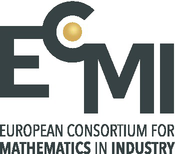The Mathematics in Industry subseries of the focuses on the research and educational aspects of mathematics used in industry and other business enterprises. Books forMathematics in series is a project of The European Consortium for Mathematics in Industry. Mathematics in Industry focuses on the research and educational aspects of mathematics used in industry and other business enterprises. Books for Mathematics in Industry are in the following categories: research monographs, problem-oriented multi-author collections, textbooks with a problem-oriented approach, conference proceedings. Relevance to the actual practical use of mathematics in industry is the distinguishing feature of the books in the Mathematics in Industry series.
More information about this subseries at IndustryMathematics in Industry http://www.springer.com/series/4651 are in the following categories: research monographs, problem-oriented multi-author collections, textbooks with a problem-oriented approach, conference proceedings. Relevance to the actual practical use of mathematics in industry is the distinguishing feature of the books in the series.
Mathematical Modelling in Real Life Problems
Case Studies from ECMI-Modelling Weeks
1st ed. 2020

This Springer imprint is published by the registered company Springer Nature Switzerland AG.
The registered company address is: Gewerbestrasse 11, 6330 Cham, Switzerland
In recent years, numerous reports and studies have demonstrated that Mathematics is an essential tool to improve industrial innovation, and mixed academic–industrial consortia and networks, like ECMI (European Consortium for Mathematics in Industry—http://ecmi-indmath.org) and MI-Net (Mathematics in Industry Network—https://mi-network.org/) are working to foster the recognition of Mathematics as an enabling technology.
In this framework, an increasing need of mathematicians trained to work in an industrial environment has been observed and has pushed the academic world to provide novel training formats, able to respond to industrial needs. ECMI in particular has established an educational programme, offered by the ECMI Educational Centres, which is aimed to provide such training. Its main ingredients are mathematical modelling activities, in particular the International Modelling Weeks and the modelling seminars.
The International Modelling Weeks format is an international workshop where master students and/or early-career investigators (PhD students and postdocs) receive hands-on training in problem-solving, teamwork, and in learning to exploit their different skills to model efficiently non-mathematical problems. During modelling Weeks are training workshops where students from different countries spend a week working in small multinational groups on projects which are based on real-life problems. Each group is led by an instructor who introduces the problem, usually formulated in non-mathematical terms, on the first day and then helps to guide the students to a solution during the week. The students present their results to the other groups on the last day and then write up their work as a report. This format allows to train students in mathematical modelling and stimulate their collaboration and communication skills, in a multinational environment. The instructors “emulate” the figures of real industrial delegates, thus pushing the students to start working in a non-academic environment.
Modelling seminars are also offered locally by the ECMI Educational Centres. They have a structure similar to the modelling weeks, but are usually spread over one semester, and are attended only by the students enrolled in the offering university.
This book is a collection of real-world problems that have been assigned to students during the ECMI International Modelling Weeks. The problems are first described, and then a possible solution is proposed. The aim of this book is thus to provide a set of examples, in different fields of application, and faced with different mathematical techniques, to support teachers and instructors to organize future modelling activities.